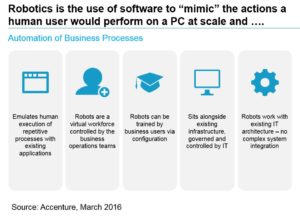
Businesses today are competing in the digital world – for which they need to process increasing volumes of data and mine it for better and deeper quality of actionable insights. While technology that can make all this happen is necessary – evolved and seeking professionals skilled in its use can make the difference between success and failure.
A Gartner research projects that by 2020, automation and cognitive technologies will reduce headcount in shared services organisations by as much as 65%. Departments that will see this reduction will be Human Resources, Information Technology, Finance and Customer Service wherein an “integrated workforce” will include bots working alongside people – taking on relatively simple and repetitive activities so that humans can focus on complex exceptions.

While bots or software robots are configurable software set up to perform tasks – Robotic Process Automation enables tools to create software robots to automate any business process. It is now that Robotic Process Automation (RPA) is entering all areas of business. For finance organisations it is all set to become the game changer as it will help enable the following :
- Optimised productivity and margins through technology-enabled efficiencies.
- Employees deployed more effectively in roles that require creative, value-add skillsets.
- Greater employee satisfaction and growth .
- Leadership status for the company
- Empowered workforce makes smarter decisions and creates innovation
- Removal of process defects due to inconsistency, misinterpretation and human error.
Although applications of RPA are varied, a finite set of criteria can be used to determine the following automation opportunities in the world of Finance and Accounting for maximum impact:
- The process should typically require employees to access multiple independent systems to complete the process.
Opportunities for RPA need not necessarily be limited to high-value transactional processes. - Since manual activities in a process can result in a substantial number of errors due to human operator mistakes, flexibility of and changes in work-force, complexity of work or infrequency in the activity.
- Hence, any process that is labour- intensive and has high throughput time with potential for high-cost impact errors – is a good opportunity for automation.
- Simpler processes with little exceptions in delivery are excellent candidates for robotic automation in the beginning. Via learning, an organisation can progress to processes which are complex or error prone
- Processes with little automation support with large chunks of manual work effort benefit more from Robotics Process Automation, although the process does not need to be completely ‘straight through processed.’
- The process needs to be clearly and completely defined and documented in terms of a set of unambiguous business rules that describe the process.
Considering the above criteria I believe the processes detailed in the infographic alongside can be considered as optimum opportunities for RPA in Finance.
 Per my back-of-the-envelope estimations , the total scope for Full Time Employee (FTE) reduction in case of the implementation of the above processes can be anywhere between 20% to 40% . Asides of the convenience, benefits include a boost in profitability and increase in operational efficiency. Freed-up or optimised resources can be used to perform high level activities, assist in critical initiatives requiring a creative and human approach while driving competitive advantage.
Per my back-of-the-envelope estimations , the total scope for Full Time Employee (FTE) reduction in case of the implementation of the above processes can be anywhere between 20% to 40% . Asides of the convenience, benefits include a boost in profitability and increase in operational efficiency. Freed-up or optimised resources can be used to perform high level activities, assist in critical initiatives requiring a creative and human approach while driving competitive advantage.
A research study surveying more than 240 leading banks, reinforces the belief of respondents that the new workforce will be comprised of employees as well as intelligent machines, and collaboration between the two will be critical and training essential.
While we don’t know exactly what the finance and accounting organisation of the future will look like – but we do know it’s changing fast. And one of the most powerful factors accelerating this transformation is RPA. In the end, companies will need to chart their own courses. But no matter which kind of future is envisioned, leaders will likely be those who figure out how to make technology
work for finance – and for the whole business as well.
However change may not be easy to come about unless a CFO turns into an Innovator and drives the change. And educates his team on available technologies and opportunities. And also encourage a culture of innovation and continuous improvement across the department and the organisation.
With the help of smart, scalable RPA which is all set to be a vital component in the Finance departments of organisations of the future.




